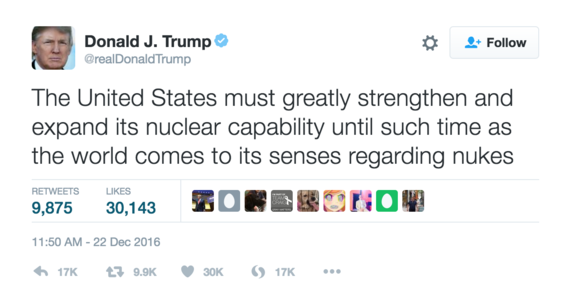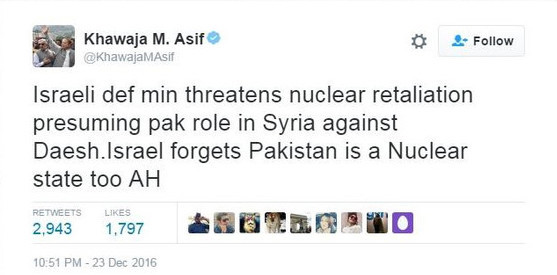Complexities and nuance are not easily captured in 140 characters. Seriously, let's take an example many of us are probably familiar with: the Vietnam War. Now I'll try to do that conflict justice in 140 characters.
The United States hoped to oppose Communism and by proxy the Soviet Union, so in the mid-20th century it slowly became more and more entangl...
Didn't even get to finish the word entangled, let alone get to the Gulf of Tonkin, Tet Offensive, Cambodia... you get the point. If I can't describe one of the definitive events of the 20th century in 140 characters, what hope do I have for describing something as politically, economically, and strategically complex as nuclear weapons policy in a single tweet? Nuclear policy was never meant to be boiled down to a tweet, and yet world leaders have recently been trying to do just that.
A few weeks ago, U.S. President-elect Donald Trump tweeted out this doozy. Working with 140 characters, he completely failed to lay out any substantive direction for U.S. nuclear policy under his presidency. Credit where it's due though: he did successfully call for a new nuclear arms race in 140 characters and that's no small feat. In any case, President-elect Trump's decision to take to Twitter to pontificate on nuclear weapons served to undermine decades of commitment to reducing nuclear weapons worldwide.
Reacting to the tweet, Global Zero co-founder Bruce Blair noted Twitter "is a tool of provocation and belligerence in the hands of Donald Trump." Blair isn't worried that a tweet alone will spark a nuclear catastrophe, but he does think that an ill-timed missive could make an already tense situation escalate past the point of control. For instance, in 1973 Soviet leader Lenoid Brezhnev threatened to intervene in the Arab-Israeli conflict. In Blair's words, "that triggered the United States under Nixon to respond by going on nuclear alert. We went to Defcon 3. Words and threats have consequences in the nuclear operations world, and can instigate a cycle of escalation that spins out of control."
President-elect Trump's tweet was shocking, but what's really shocking is that just one day later, Pakistani Defense Minister Khawaja Mohammad Asif sent out a tweet reminding Israel of his nation's nuclear capability.
What was this apropos of? A fake news story. Responding to a perceived threat with nuclear sabre-rattling is one thing, but to do it through the instantaneous and highly-visible medium of Twitter? That's another thing entirely. The immediacy of a tweet, which can be written in the heat of a moment and sent out to the entire world before all of the facts are in, makes it an immensely poor medium for conducting nuclear diplomacy.
It is also worth noting that this sort of misunderstanding is not unprecedented in the history of nuclear weapons. During World War II, when the Japanese emperor was asked if he would surrender, he used the word "mokusatsu." That word has multiple meanings, one being "to withhold comment." But it was translated for Washington, and in many international news agencies, as "we are treating your message with contempt." Within days of receiving word of this perceived belligerence, U.S. President Truman decided to use the atomic bomb. This simple misunderstanding contributed to the death or injury of as many as 250,000 people in Hiroshima and Nagasaki.
What if Israel had interpreted Minister Asif's tweet as a threat of nuclear attack against Israel instead of calmly informing him the news story was fake? Would tensions have escalated?
In the cases of both President-elect Trump and Minister Asif, there can be seen a profound disrespect of the immense gravity that comes with the responsibility of managing nuclear weapons. By impulsively taking nuclear policy to the Twittersphere, these leaders have leaned in to a more dangerous world.
If there's a lesson to be found in these two episodes, it's that the way leaders talk about nuclear weapons has immense ramifications beyond the scope of Twitter. 140 characters may not be enough to adequately discuss nuclear policy, but it's surely enough to profoundly destabilize the world and imperil the lives of millions.
Global Zero is doing everything it can to ensure that an errant tweet doesn't lead to nuclear escalation. Will you help us fight for a world without nuclear weapons?

